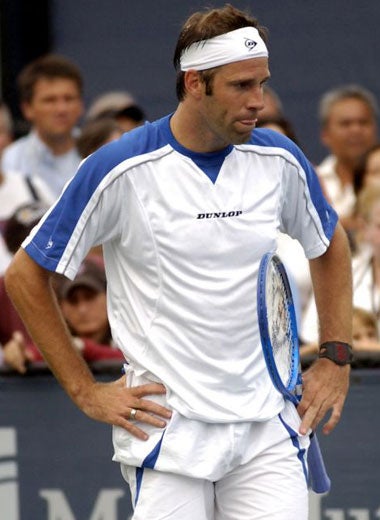Murray in control but Rusedski faces end

For Andy Murray it was a new beginning, a winning start at his first Grand Slam tournament under his recently appointed coach, Brad Gilbert. For Greg Rusedski it was surely the end of the line, a final farewell after 14 years on the biggest tennis stages.
It was the night of the Brits here on Wednesday, with two young guns and two old hands trying to negotiate the first round of the US Open. Murray, 19, weathered a brief storm whipped up by Robert Kendrick to win in four sets, while Josh Goodall, 20, was far from disgraced in losing by the same margin to Paul-Henri Mathieu, a talented Frenchman.
Rusedski, 33 next week, played his perennial rival, Tim Henman, 12 months his junior. For a set we saw the Rusedski of old, punching out big serves and belting forehands down the line, but by the end a hip injury, which has ruined his summer and is now set to end his career, was hampering his movement. Henman won 7-6, 6-2, 6-3, his seventh successive victory over his fellow countryman, to earn a second-round encounter with Roger Federer. They met at the same stage at Wimbledon, two months ago when the Briton won just six games.
Although Rusedski refuses to throw in the towel just yet, particularly as he hopes to play in Britain's Davis Cup relegation match in Ukraine later this month, he all but acknowledged that this was his final bow. The former world No 4 is now ranked No 136, too low to gain direct entry even to some of the lesser ATP tournaments.
Rusedski says he still has the desire to succeed, but he would probably need surgery on the hip cartilage he tore in June if he wanted to compete successfully at the highest level again.
"You have to be brutally honest with yourself," Rusedski said. "You have to say: 'Am I just travelling here to make up the numbers? And am I happy doing that?' Before I had this injury I always still felt like I had a chance to win a major. Once you get this sort of injury it takes your hope away a little bit more because you can't physically sustain it."
Admitting this may well be his last Grand Slam appearance, Rusedski added: "I think the worst thing is seeing an athlete when you can tell they can't do it. I don't want to be waving to people and bowing out after first rounds just because I'm hobbling around. I think it's better to make a solid decision, which I'll probably make after Ukraine, if I get chosen for the team."
Murray said that Rusedski's departure would be a loss both for British tennis and himself. "When I first came on the tour I practised with him and spoke to him a lot," Murray said. "He's a very kind guy and he always looks for the positive in everything, which makes him like Brad [Gilbert] in a way."
Rusedski believes that Gilbert has already helped Murray to control his emotions better. During his 6-2, 1-6, 6-3, 6-3 victory over Kendrick, who took Rafael Nadal to five sets at Wimbledon this summer, Murray kept his head despite derogatory comments from the partisan crowd, some contested line calls and a whirlwind second set in which his hit-and-hope opponent barely missed a shot.
"I don't remember shouting in anger once during the match and I didn't throw my racket," Murray said. "I've started to deal with things much better. I don't get too upset on the court now. I try to keep my emotions a bit more in check."
Murray, who yesterday lost his first-round doubles match alongside James Auckland to Ashley Fisher and Tripp Phillips, now plays Alessio Di Mauro, a 29-year-old Italian clay-courter who lost only three games when they met in a Challenger event in Italy last year.
Elsewhere, Nadal dropped his first set of the tournament in beating Luis Horna, while Lleyton Hewitt conceded only eight games on his way to victory over Jan Hernych.
Some of the women's second-round contests were embarrassingly one-sided. Six of the top 10 seeds Justine Henin-Hardenne, Maria Sharapova, Elena Dementieva, Nadia Petrova, Svetlana Kuznetsova and Lindsay Davenport dropped only 12 games between them. Daniela Hantuchova, the No 17 seed, lost 7-5, 6-3 to Serena Williams, who needed a wild card to play here after six months out of the game.
Join our commenting forum
Join thought-provoking conversations, follow other Independent readers and see their replies
Comments
Bookmark popover
Removed from bookmarks